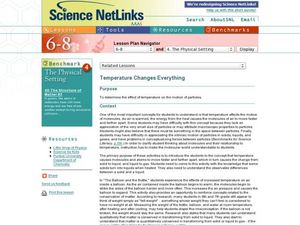Curated OER
What Is The temperature?
Young scholars use a thermometer to measure temperature changes. They measure temperatures indoors and out, and graph the information.
Curated OER
Convection in a Pan
Students explore convection. In this lesson on heat and energy, students investigate how heat moves in convection currents. They use their finding to better understand how convection currents effect the movement of tectonic plates.
Curated OER
Temperature Changes Everything
Learners determine the effect of temperature on the motion of particles. They study the difference between particles in a gas, liquid, and a solid and see how the characteristics of solids, liquids, and gases can be explained by particle...
University of Minnesota
Homeostasis of Thermoregulation
Whether you're battling the flu or trying to warm up on a chilly day, your body's ability to react to temperature change is fascinating! Anatomy scholars discover the fantastic feedback loops that control body temperature in a rigorous...
Space Awareness
Seasons Around the World
Why does Earth experience summer, fall, winter, and spring? Using an informative demonstration, learners see how the angle of the sun on Earth and the rotation of Earth determine the seasons. Scholars work in pairs to learn that the...
Colorado State University
How Can I Turn a Solar Oven into a Refrigerator?
Whether you want to heat things up in science class or cool things down a bit, an intriguing lab's got you covered! Science scholars explore the principles of thermodynamics using a solar oven, then change the conditions to turn their...
American Physiological Society
Why is Kettle Corn Cooked in Copper Pots?
The kitchen — it's not just for eating anymore! Specific heat is often a difficult concept to grasp, so give it context by relating it to cooking. Learners gain experience in the principles of thermal energy transfer by designing an...
Serendip
Should You Drink Sports Drinks? When? Why?
New research proves even rinsing your mouth with carbohydrates without swallowing improves performance of the central nervous system. While some think sports drinks are amazing, others say they are a waste of money. Scholars learn about...
Beyond Benign
Exothermic and Endothermic Reactions
How can you tell the difference between endothermic and exothermic reactions? Chemistry scholars perform and observe two chemical reactions, measure the temperature throughout, then draw conclusions about changes in energy from their...
CK-12 Foundation
Broken-Line Graphs: Heating Curve of Water
Examine the unique graphs coined broken-line graphs. Using the phase change of water for data, learners answer questions related to the temperature and energy at different times in the cycle of the phase change. Questions focus on the...
Curated OER
Heat Unit
Students define thermal equilibrium. They distinguish between internal energy and heat. Students describe how the quantity of heat that enters or leaves a substance is measured.
Curated OER
The Urban Heat Island Effect - Lesson 2 (Grades 8-9)
Students use the scientific process to show that when various surfaces are exposed to similar environmental conditions, surface temperatures may vary. They examine the "urban heat island" phenomenon and analyze why it increases energy...
Curated OER
The Role of the Atmosphere and Greenhouse Effect in Determining the Surface Temperature of the Earth
Students complete research and solve problems that show the factors that determine the temperature of the earth's surface including the effect of greenhouse gases. They look at the relationships between solar energy, atmosphere, and how...
Curated OER
Energy and Enthalpy
In this energy activity, learners calculate how much energy is required to heat solutions. This activity has 4 problems to solve.
Curated OER
Activity #15 What Happens To A Liquid As Energy Is Added?
Pupils model the arrangement of particles in a liquid. They use the model, to demonstrate how a gas is formed from a liquid with no increase in temperature as energy is added. Pupils model the arrangement and movement of gas particles.
Curated OER
Measuring Thermal Energy Transfer
Students conduct an experiment to calculate and quantify heat transfer. They conduct the experiment, and complete a data and lab conclusion sheet.
Curated OER
Demonstration of Factors Affecting Soil Temperature
Learners examine the influences of water and mulch on soil temperature. For this investigative activity students complete a soil experiment.
Curated OER
Heat: The Transfer of Thermal Energy
In this heat worksheet, students complete experiments with heat and answer short answer questions about the transfer of thermal energy. Students complete 4 questions, one chart, and one bar graph.
Curated OER
Heating the Earth
Middle schoolers explore how the angle of sunlight affects the Earth's temperature and seasons and then apply this understanding to their local situation.
Curated OER
Heat and Color
Sixth graders conduct a simple experiment to explore the ways that color can affect heat transfer. They review the three ways that heat can transfer: conduction, convection and radiation.
Curated OER
Heat and electrical resistance (Middle, Science)
Middle schoolers work in teams to create electrical resistance when studying heat and thermal energy.
Curated OER
Heat and Electrical Resistance
Students discover electrical resistance and how it is directly related to thermal energy through a hands-on activity. Working in groups, they wrap a wire around a thermometer and the positive and negative poles of a D cell battery and...
Curated OER
Heat Capacity Problem Set
In this heat capacity worksheet, students calculate the amount of energy required to raise the temperature of a certain mass a determined amount of degrees. This worksheet has 4 problems to solve.
Curated OER
Heating the Atmosphere
Learners construct a thermograph for maximum and minimum temperatures for the 2-week period. They illustrate how the earth's atmosphere is heated by convection and conduction currents and evaporation of water.

























